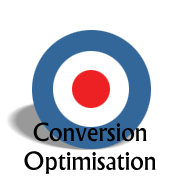“Why are we so dependent on Google ?“
 The obvious answers is : Because 94% of Australians use Google to search the web. However, another valid answer which got quite a lot of attention is “We aren’t“. The point here is, that although Google is clearly very important for many site owners to generate traffic from Search… there are plenty of other ways – not necessarily search related that we could 9and should) be using to get visitors to our websites.
The obvious answers is : Because 94% of Australians use Google to search the web. However, another valid answer which got quite a lot of attention is “We aren’t“. The point here is, that although Google is clearly very important for many site owners to generate traffic from Search… there are plenty of other ways – not necessarily search related that we could 9and should) be using to get visitors to our websites.
Stephen Grealy (from Grealy Good SEO) presented this session and detailed a range of different (not necessarily Google related) activities which site owners should be using to help generate traffic. Obviously the techniques used will be dependent on the niche, the products/services you are promoting, and where your target market “hang out” but many of the activities would be relevant to most site owners.
Stephen provided a detailed case study on a Molecular Food Kits website which was launched in July 2012 and through a variety of techniques, generated 10s of thousands of dollars in sales – before it even started to show up in Google rankings.
Some VERY important points raised were – “Don’t wait for Google” and “Treat you website as an online business, NOT just a website online“.
Outlined below are bullet points which highlight some of the suggested activities for improving your sites traffic and sales.
- Implement SEO Fundamentals (but don’t just wait for the traffic to come)
- Implement basic (relevant) link building
- Use Webmaster Tools and pay attention to what it says
- Know your Competitors – and interact with them
- Know your Target Market – and engage with them (particularly social media)
- Traditional marketing should NOT be ignored (if that is where your market is)
- Youtube
- Ebay
Attendees of this event will receive a link to the full slide pack…. If you’d like to learn more about optimising your own website, building traffic and growing your business online, make sure you come along to the Next Brisbane SEO event ![]()
 Jon Whitehead from Metricks provided a very useful and informative presentation on the topic ‘understanding analytics’ and covered the following main areas :
Jon Whitehead from Metricks provided a very useful and informative presentation on the topic ‘understanding analytics’ and covered the following main areas :
- The ABC of Web Analytics – acquisition, behaviour and consequence
- Applying the ABC to Google Analytics to focus your efforts
- Extra settings, code and reports
- Importance of setting up goals and campaign tracking
- Tracking SEO with Google Analytics
- Other tools to consider
Jon has very kindly provided a copy of the presentation - Understanding Analytics slide pack – and would be happy to answer any further questions you may have so feel free to contact him via at [email protected]
Web Analytics Training Workshops
In case you missed the session and would like to learn a bit more about the basics of Analytics, you may be interested in attending a 2 hr Introduction To Web Analytics Workshop, in Brisbane next Thursday 17th of May (just $44).
If you were inspired by Jon’s presentation… and would like to get serious about maximising the benefits of analytics for your own site there is also a One Day Google Analytics Training Workshop in Brisbane on Friday 25th May, which will guide you through the most important features and functionality of New Google Analytics, and get to review, analyse and take action on on data from your own websites.
Thanks again to those who attended, come along to next months Brisbane SEO Meetup when we will be discussing SEO in a post penguin world
]]>The problem with this whole course concept they bought into is wrong and not good for the search industry or those looking to join the industry as its too short term focused and doesn’t build the right knowledge you need to succeed long term. Some of the other issues I see that many of these courses can lead to bad habits being encouraged such as risky link building techniques, use of article spinners or spammy promotional practices via social spam or blog/forum spam. The other issue I have with these courses is that many of their solutions often require you to buy their white labeled software to get the “most benefit” from their proven technique.
If their whole “marketing system” relies on buying existing websites other people are trying to sell, that is the first problem as there are so many ways that people selling websites can spoof/fake key traffic or social signals to inflate their prices which mean you can often buy a dud or overpriced website. It can take a long time to learn all the right parts to look for when buying a digital business and a handful of ebooks and webinars is not going to give you enough experience or background to compete with existing players in the market. I’m not saying the general concept won’t always work or majority of the sites listed on Flippa aren’t genuine and transparent but there is NO simple tick and flick process that will work every time. Even with years of experience I’ve bought a number of dud domains over the last year because I over-invested or missed a warning sign during my initial research.
The process around learning about any aspect of digital marketing is still mostly untested and there are a number of sharks out there that offer instant gratification or “proven systems” that they have successfully sold to thousands of other gullible people. If you are serious about learning about SEO, Web Analytics, Social Media or PPC there are dozens of quality blogs available, free webinars, amazing whitepapers, conferences and exceptional books on every niche topic you could imagine. There are so many free resources out there that you can use to build your base knowledge there is no excuse for anyone to need to spend $3000 on a “system” that is built around outdated processes. If you are going to spend money spend it on a handful of great marketing books we have listed, attend in person workshops and a conference or two like SMX or SES.
There is nothing that beats hard work, lots of reading and research and absorbing as much as you can about your chosen area of digital marketing. Also much of what worked a few years ago has almost stopped working of late with recent Google algorithm updates and today everything is much more competitive so you need to make sure you are learning the right processes and not just gaming the system for quick wins. If you don’t have the time to invest in yourself maybe digital marketing is not the right industry for you…. If you want proven systems go buy a franchise!
]]> Stephen Grealy gave an awesome presentation on Keyword Analysis and outlined a whole range simple but powerful strategies for digging deep into keywords.
Stephen Grealy gave an awesome presentation on Keyword Analysis and outlined a whole range simple but powerful strategies for digging deep into keywords.
Rather than limiting Keyword Analysis to the standard “Keyword Tools”, using the technqiues that Stepehen presented will give you and edge on your competitors and make it more likely for you to find powerful and lucrative keywords to base you optimisation on.
Although Stephen started of squeaky clean and “white”, the session did start to slide a little into “the dark side” as the evening progressed, but gave some great ways that keywords could be cleverly applied.
Stepehn has also provided the Slide Pack (Powerpoint format) from his presentation and a Keyword-Research-Template (Excel format) to help guide you through the procedures discussed.
]]>
 The Brisbane SEO Meetup group kicked off 2012 with “roundtable” Question and Answer Session – which gave attendees the opportunity to raise any SEO related questions they wished, and have them discussed amongst the group.
The Brisbane SEO Meetup group kicked off 2012 with “roundtable” Question and Answer Session – which gave attendees the opportunity to raise any SEO related questions they wished, and have them discussed amongst the group.
Because we had nearly 30 Attendees, we split into three separate groups and discussed questions which had been pre-submitted by members (as a part of the RSVP process). SEO, being what it is, there is rarely a definitive “correct” answer to many of these questions, so a round of lively (and sometimes heated) debate and discussion ensued.
I have outlined below my own responses to a selection of the questions discussed. Whether you agree or disagree with my views, I’d love your feedback, so please feel free to add a comment. (note: we only publish some of the Q and As here – if you’d like more, then maybe you had better come along to our next meetup).
Q. Because a key part of great SEO is great content – what is the best way to find the perfect balance between inbuilt SEO and great content (i.e. time spent on each).
Balance is the key to this question, because the optimisation strategies used will vary depending on the niche, the competition, and the keywords being targeted. The strategies used should also change depending on the market, the
“stage” the business is at and what competitors are doing. Here is a quick outline for what I believe helps get a good balance :
- Set in place Analytics (so you can start to monitor and measure)
- Undertake a Keyword Analysis (to determine which keywords are likely to be the best ones to optimise for)
- Ensure that SEO Fundamentals are in place (i.e. the site is search engine friendly and is structurally sound – from an SEO perspective)
- Generate Quality, Unique, Keyword Rich, USEFUL content
- Undertake Link Building
- Review Analytics
- Determine optimisation priorities and strategies and implement
- Repeat steps 4-7
Q. I am new to SEO techniques and am struggling to create an efficient list of meta keywords for my online business and for my small business in eBay. How can I promote SEO for my online business?
Understanding Keywords is critical to good SEO – after all it is these keywords that people use in search to (hopefully) find your products and services. Any SEO campaign should start with a Keyword Analysis (see the Keyword Analysis Tools section of Our 30 Favourite SEO Tools post). A Keyword Analysis needs to try and identify the keyword phrases that are most likely to generate sales/enquiries, and typically you would start with high volume keywords, then once you have some data (about which keywords result in conversions) this should be fine tuned for high converting keyword phrases.
I’m glad that you brought up your eBay store. Many people might consider that there is no point SEOing an eBay store – I disagree. Although eBay imposes lots of constraints over the structure/layout of your eBay store, and you are limited as to what On page SEO tweaks you can do – understanding which keywords to use in your product titles and descriptions, and Off Page strategies such as link building, can both give you an edge over your eBay competitors.
Q. What tools can we use to find out if our SEO efforts are working
One of the fabulous things about SEO is that because of all the stats and metrics available, it is usually possible to monitor and measure the effectiveness of SEO activities. Initially you may consider Rank Monitoring Tools, or Analytics to look for traffic volumes, however, you need to consider what you are actually trying to achieve.
Although increased rankings and traffic are often on of the outcomes of effective SEO, the ultimate aim in most cases is higher conversion rates – i.e. increased sales or more enquiries. So the most important measurement is likely to be conversion rates. Google Analytics, properly configured to track goals and conversions is probably the most useful tool there is for tracking the effectiveness of SEO.
Q. How to setup Google Places properly?
Google Places is relatively easy to setup – but it is also very easy to setup badly. Also (like many things Google and most things SEO for that matter) the options, features and guidelines seem to change fairly regularly, so what may have been effective several months ago may now no longer apply. I’d suggest talking to an SEO Pro who specialises in Local SEO.
Q. What impact do you think Social will have on SEO moving forward into 2012?
Google’s (and every other search engines) “job” is to provide the best possible results for any given search query so they use whatever factors they can to help optimise their search results. They would be mad to ignore social signals, and Social media is undoubtedly already having some impact on rankings and search results.
Social should not be ignored as an SEO strategy, but can take a lot of time and effort to do properly, so unless your niche has strong links to Social Media (i.e. that’s where your target market hang out), I think that SEO effort is better spent on more traditional strategies.
Q. Is backlinking the ultimate technique for maximum SEO?
Whilst backlinking is very important – for me, the “ultimate” SEO technique has to be based around content. If you have thousands of links pointing to crap – what is the point? Whereas if you have some amazing content (that is interesting, entertaining, educational, controversial, funny or just plain useful) you are likely to get the thousands of links anyway.
Q. As a newbie, what is the most user friendly SEO software compared to what is the most used in the industry?
From a development perspective I think that WordPress wins hands down for Search Engine Friendliness (which is one of the reasons why 24% of new US sites use it). If you have not heard of WordPress – go do some research, or get yourself some WordPress training or Consulting.
If you are looking for SEO Tools – I suggest that you review Our 30 Favourite SEO Tools post).
Below are some of the other questions raised and discussed at the January Brisbane SEO Meetup, so if you’d like these (or any other SEO question) answered – maybe you should come along to the next Brisbane SEO meetup.
- Q. How can you improve your domain authority?
- Q. For better Ranking, Traffic & Conversions – out of 100 how what % do you think is On Page, how much is Off Page and how much is Social Media?
- Q. How can we get on (or as close as possible to page 1) on Google/Bing for specific keywords
- Q. Do you have a general online marketing strategy that you can use for any project?
- Q. What influence does Socvial media signals have on SEO?
- Q.What pricing structure do SEOs commonly use?
 Last nights SEO Q and A session was the first one we have tried at the new venue and seemed to be very well received. We split into three groups to discuss the questions that had been submitted by members as a part of the RSVP Process.
Last nights SEO Q and A session was the first one we have tried at the new venue and seemed to be very well received. We split into three groups to discuss the questions that had been submitted by members as a part of the RSVP Process.It was much easier (and more productive) to deal with questions in a small group, and by carefully interspersing SEO Pros, with Newbies and Intermediate SEOs we seemed to get a very good mix of skills, experience, and perspectives. In 40 minutes we managed to cover many (but probably not all) of the questions – before combining into the full group to review and discuss the “highlights”.
Below is a Guest Post – provided by Jon (from Metricks – a Brisbane web analytics and conversion consultancy) with his summary of some of the questions answered in one of the groups (along with a few additional comments of my own). I also hope to create another post soon with some answers to some of the other questions raised.
I attended my first SEO meetup since February last night – much has changed. A new venue, our own room, great food and the ability to actually hear each other J met some great people and Andy ran it like clockwork.
Jon’s SEO Q and A Summary :
Tonights session was a Q and A on anything related to SEO. We were in 3 groups, our group managed to get through 6 of the 17 questions submitted before the session.
Q1 After creating a site how much admin overhead should be dedicated to on page SEO? Should this be an afterthought or built as part of the site development process?
The short answer is definitely not an afterthought. SEO is an intrinsic part of the build process, and not only that, it needs to be addresses in the planning stage in terms of:
- The niche being targeted (what language do people use in the niche? How do they refer to your product?)
- The business name – decision between a ‘cool’ name and one related to the topic/location/type of industry. The latter is much better for use as a domain name and on a site as well as for keywords
As part of the build SEO is one factor that should be taken into account; it can influence how you categorise and build out the IA and informs the content on the site. Also make sure all onsite factors that help SEO are taken care of – title tags, description, internal linking, etc.
Once a site is launched SEO remains important – optimizing content, getting backlinks.
Basically any holistic approach to online has to include SEO for success.
Q2a best sources of paid or free SEO information?
Andy recommended Searchengineland and SEOMoz. SEObook, High rankings and SEO by the Sea were also mentioned, then we had a long discussion on the pros and cons of Warrior forum which boiled down to use the forums but be careful in WSO territory; only buy what you have an immediate need for as there is a lot of recycled and downright out of date information on there.
2b a related question – Is SEOMoz pro membership worth it?
Andy had been a member for a couple of years, but found he was no longer using it enough to justify the ongoing membership. Also the tools US focused and aren’t always so helpful for Australian market. Then we got onto a tools discussion, always check what you have first and make processes around standard tasks so you don’t get halfway into manually doing a job when you have an excellent tool that can do it automatically. Also a $300 product isn’t necessarily better than a $30 product, use due diligence, research to ensure it will work for what you are trying to do.
(Andy says – with any online tool, make sure that research and understand where the data comes from and how it is used. Try the tools agains7t a site that you know/control and see if the stats that they come up with are accurate before putting too much trust in them)
2c SEO & Social – what are the implications and what to do?
Given Googles changes this year, Social is definitely some kind of factor and must be influential. If the market you are targeting is using Social Media, definitely get on there to, if not, maybe you don’t need to.
2d Related to previous question, should we be using author rank?
Basically, yes,
(Andy says… this is another “factor” that Google (and other search engines) may use to influence rankings. It has regained popularity recently because Google made some announcements about it in July this year, and Google+ has highlighted support)
See Matt Cutts videos on the subject :
Q3 How much should I pay for an SEO consultant?
How long is a piece of string? Depends on requirements, most of us like to educate clients also and demonstrate results so client gets value on top of better rankings.
(Andy Says – when hiring am SEO consultant, make sure you know how much they charge and whether it is an hourly rate or a monthly retainer. Make sure you know what you are getting, and how “success” is to be measured)
Q4 What should you or your clients be doing to improve mobile traffic?
If your market is based on service/location/immediacy should definitely consider mobile, also focus on what content is of most importance to a mobile user. Use analytics to see your overall mobile traffic and drill down to identify particular pages getting mobile traffic eg services offering emergency utilities plumber, electrician etc should have a number right in your face.
Once we’d discussed our answers each group discussed their answers with the whole group. A great session with lots of good information shared, I’ll definitely be back for the next one.
Oh and goodbye PageRank
(Andy says…It was highlighted that PageRank had apparently disappeared on 6/10/2011. However it appears that Google has simply changed the Lookup URL – causing many third party tools to fail – it is still available via the Toolbar – see: http://searchengineland.com/oh-no-what-happened-to-my-pagerank-95929 for more info)
]]>Note: not all of the tools listed here are necessarily tried and tested – although most are tools widely used by SEO Professionals, there are also others which were suggested at the meetup that have been included here for completeness.
We attempted to group various tools into different categories (although some tools do belong in multiple categories). We’ve not of course been able to go into much detail here about how to use any of these tools but may (if there is enough interest) cover some of these SEO tools in detail at future SEO Meetups. Most of the tools listed below are free, some are paid, and many of the paid services also offer a free (cut down) version of the tool as well.
If there are any other SEO tools that you use and would like to contribute, please feel free to leave a comment.
Keyword Analysis Tools
 Google Instant – an often overlooked but very quick and easy way to check for higher volume search keywords. Hint: Log out of your Google account to remove personalisation.
Google Instant – an often overlooked but very quick and easy way to check for higher volume search keywords. Hint: Log out of your Google account to remove personalisation.- Google Keyword Tool – Allows you to enter trial keywords or a website name. Shows list of related search counts globally and locally
- Google Insights – A great tool for for showing trend data – you can compare search volume patterns across specific regions, categories, time frames and properties
- Google Analytics - Looking at your own analytics data is a good way to see which keywords are already working well
- PPC Data – setting up a PPC campaign and analysing click and conversion rates can be a very effective (and quick) way to get data about high converting (as opposed to high traffic) keyword phrases
- Your Customers – Talk to your customers to see what keywords they would/did use to find your business
- Brainstorming – talk to friends/colleagues to brainstorm related keyword phrases (don’t just rely on the keywords that you think are good)
Interestingly many of the “traditional” Keyword Tools used by SEO Pros (such as Wordstream, Keyword Discovery and Wordtracker) were felt to be of limited use to most attendees – although they can be very useful for very detailed analysis, because their data is sampled, and largely USA biased, for the most part they were not considered to be useful for Australia based keyword analysis considered.
Browser Plugins
 Firefox was considered to be the web browser of choice for SEOs – largely because of it’s plugin capabilities , with other browsers (Internet Explorer, Chrome, Safari, Flock etc) mainly only used for compatibility testing.
Firefox was considered to be the web browser of choice for SEOs – largely because of it’s plugin capabilities , with other browsers (Internet Explorer, Chrome, Safari, Flock etc) mainly only used for compatibility testing.
- SEO for Firefox – considered one of the most comprehensive (and useful) of the many SEO plugins available
- Chatzilla – useful IRC plugin to ask people for advice suggestions on SEO
- Firebug – more of a developer than SEO tool but VERY handy for debugging HTML/CSS and lots of other web page/browser based issues
WordPress Plugins
With WordPress becoming increasingly important as a blogging platform / Content management System (CMS) we felt that we simply had to inlcude some of the many SEO related plugins for WordPress
 All In One SEO – one of the original and still arguably best general purpose SEO plugins
All In One SEO – one of the original and still arguably best general purpose SEO plugins- Google XML Sitemaps – auto generates a special XML sitemap which will help search engines to better index your blog.
- Google Analytics for WordPress – easy setup your Analytics code, allows you to track your blog easily and with lots of metadata.
- SEO friendly Images – automatically adds alt and title attributes to all your images.
- SEO Smart Links – can automatically link keywords and phrases in your posts and comments with corresponding posts, pages, categories and tags on your blog.
- Sexy Bookmarks – adds an attractive social bookmarking menu to your posts, pages, index, or any combination of the three.
- WordPress SEO by Yoast - all in one SEO solution for your WordPress blog: SEO titles, meta descriptions, XML sitemaps, breadcrumbs & much more.
- And also a number of Search Engine Friendly Themes got an honourable mention – e.g. StudioPress – Genesis Theme, and Thesis
 Analytics Tools
Analytics Tools
Pretty much the ONLY tool discussed was of course Google Analytics. Way too much about this tool to cover here, but it is likely to be the topic of a future Meetup.
Ranking Tools
We were pretty pleased to discover that noone was particularly interested in PageRank, and that even our clients had started to get the picture that PageRank in itself is not something worth obsessing about. However, ranking reports can be a quick and easy way to monitor the impact of SEO strategies over a period. Many of the SEO Suite based tools (see below) offer rank tracking tools.
BackLink Tools
 Yahoo Site Explorer – once recognised as the single best way to get fairly decent backlink data on your competitors site – is now seen as no longer reliable and on it’s last legs as a useful tool
Yahoo Site Explorer – once recognised as the single best way to get fairly decent backlink data on your competitors site – is now seen as no longer reliable and on it’s last legs as a useful tool- Webmaster Tools – the most accurate source of backlink data for your own site – not available for competitors though (dammit !!!)
- Open Site Explorer – SEOMOZ’s famous Link Popularity Checker + Backlink Analysis Tool
- Majestic SEO – perhaps the worlds most comprehensive source of backlinks information
- Market Samurai - a Suite tool (see below) that offers some good backlink reporting
- Backlinkwatch – enter a website URL to get detailed information about quality and quantity of backlinks pointing to the site
- Blekko – a “search” engine with a difference. “slashtag” capabilities extend the info that Blekko offers – try www.yourdomain.com /seo
Conversion Optimisation Tools
 There are hundreds of specialist tools that can be used for Conversion Optimisation – here are a few that were mentioned :
There are hundreds of specialist tools that can be used for Conversion Optimisation – here are a few that were mentioned :
- Google Website Optimizer – Google’s free website testing and optimization tool makes it quick and easy to implement A/B split testing and monitor and measure results.
- ClickTale - discover everything visitors do on your website. Visitor Recordings, Mouse Move Heatmaps, Heatmap Suite, Form Analytics and more…
- CrazyEgg – simple and affordable heat mapping tools that allow you to visually understand user behaviour
- Screenr – web-based screen recorder makes it a breeze to create and share your screencasts around the web. From a CRO perspective this is a great tool to record test users behaviour – including their commentary on what/why they are doing thing.
SEO Tool Suites
- SEOMOZ SEO Tools – A comprehensive (and sexy) array of SEO tools : Link Building, Competitor Analysis, Keyword research, Optimisation, and more….
- SEO Powersuite – offer a range of SEO Tools from LinkAssitant – including Rank Tracker, Website Auditor, SEO Spyglass and Link Assistant
- Raven SEO Tools – Internet marketing tools for SEO and Social media (tends to be higher end, more sophisticated/complex tools for SEO professionals/agencies)
- Market Samurai – Great general purpose and good value tools for internet marketing and SEO
THE Most Important SEO Tool of All ??

And the single most important tool for any self respecting SEO is of course… EXCEL. Excel is critical for Collating, Filtering, Analysing and Sorting the reams of data that most SEOs accumulate in their day to day activities.
about the author: Andy Henderson, one of the Brisbane SEO meetup organisers is a Brisbane SEO Consultant and also provides Website Training Workshops and WordPress Training/Consulting services in Brisbane and the Gold Coast.
]]>Link Building Strategies
Many website owners feel that getting links is very difficult or that their website is not good enough to get backlinks. Link Building can be a time consuming process, but it doesn’t necessarily have to be. Here are some of the Link Building Hints and Tips that were raised at the recent Brisbane SEO Meetup :
1. Make sure that your website is link worthy
 One of the fundamental stratgies for getting backlinks (and probably the easiest way to ensure natural, relevant and quality link building) is to ensure that theer is actually something on your wbesitye that is worth linking to.
One of the fundamental stratgies for getting backlinks (and probably the easiest way to ensure natural, relevant and quality link building) is to ensure that theer is actually something on your wbesitye that is worth linking to.
If you stumbled across your site, would you link to it ? If not, why would anyone else bother? Here are some questions that you should consider to help you determine what type of ciontent could lead to oitheres wanting to link to you :
- What types of sites do you link to?
- What types of things are relevant/interesting/linkworthy for your niche?
- What makes your company unique? (How are you different to your competitors?)
- Do you offer giveaways or competitions?
- Are there any news or stories about the people in your company?
Create pages/posts on your website that deal with the type f content that others will find useful content and they are more inclined to link if you ask – you also might be pleasnetly surprised at how many links you start to get without even asking for them.
2. Directory Listings
One of the quickest and easiest ways to start a link building campaign is to add links to some of the many online business directories. Theer are many many dirtectories out there, some are general, others might be specific to your niche, some are free and others require a listing fee. You should be very careful about where you list. Some free directories are actually quite good, many paid directories can be a waste of money. Spend some time reviewing the types of sites listed – and also check to see whether your competitors are listed. when you do searches in your niche you may start to notice particular directories that are showing up consistently – you should consider listing with these.
Some of the Australian Directories worth considering are TrueLocal, HotFrog and AussieWeb.
Some of the paid directorties which have historically been worth opaying for listings are Yahoo Directory, Best of the Web, Joe Ant.
Remember, directory listings may be a good start, but because theye are relatively easy to do, it is likely that many of your competitorsa are also using this – so if you want to sta6y ahead of the pack, you will need to do more than they do.
3. Forum/Blog Comments
Where does your target market go online? Which websites, forums and networks are used by your customers? These websites and forums are the types of sites from which you should try to get backlinks.Adding comments to relevant forums has also long been considered a useful backlinking strategy. The technique is to find a forum (or blog post) that is relevant to your niche, and leave a comment – along with a link back to your site (whether as a suggested source of further information, or as part of your “signature”).
It is importanat that when you plan to comment on a forum, that you actually add value. Participate in the forum, get a feel for the conversion, and try to ensure that your comment is informative, helpful or useful. A comment such as “Come to my website – xyz.com” is likely to be considered as span and could give you (and ytour sitre) a bad reputation amiongst fiorm members, whereas a seroies of helpful, useful and relevat comments and interactions over a period, with a few subtle references to your site is likley to be more successful.
There has been loads of debate over how the “nofollow” attribute may affect your backlinks from forums, but whether or not this has a direct impact, the value of these tyopes of links is considered to be not as useful as it once was. But there are plenty of other reasons why participating in forums can be of benefit. Forums where your potential customers hang out are a great place to find out what people are talking about in your niche. What are their problems? What do they need? What are they saying (if anything) about your business? Visitors to these forums might also directky follow a link back to your site and become a customer.
It is possble to use “clever” search queries to identify relevant forms to your niche. Queries in Google (or other search engines) based on the following can make it easier for you to find places to leave comments :
“your niche keyword” +forum site:.com.au
“keyword” +comment site:.edu.au
“keyword” +”post a comment” site:.gov.au
4. Product reviews
Consider sending out a free product (or offer a free trial of a service) to influential bloggers/users in your niche in return for writing a review on their site.
5. Offer a Competition
What are a bunch of links worth to you??? Consider buying something “cool” in your niche (or use an unwanted gift) and offer it as a prize in a competition. Notify relevant websites/bloggers and encourage them to link to the competition.
6. Review your business memberships
Are you a member in a business association? Have your company or your products received any awards? Is there a local Chamber of Commerce? What are the governing bodies for your industry? Check if these websites link to your site and try to find new business associations that might be related to your business. This can be particularly useful for getting Locality targeted links.
7. Indirect Competitors
A link from a closely related, relevant website is better than one from a site which has little or nothing to do with your niche. You probably wouldn’t get a link from a direct competitor, but if your product/service is only avaialble in a certain geographic area, it could be mutually beneficial (and sensible) to exchange links with a similar business in anotjer location. For exampler, A Brisbane based BMW dealer, is unlikley to see a Perth BMR dealer as a competitor, but linikinbg to each others websites might be a good idea.
8. Leverage your offline relationships
Offline relationship that you have with other businesses, people and publications can often be turned into online relationships that include links to your website.
9.Write testimonials
If you like the product or service of a company, send them a testimonial. Your testimonial may be listed on the company website along with a link to your site.
10.Sponsorships and social activities
Does your company sponsor any local activities? Do you support relief organisations? If you do, you can get direct links from the organiser of the activity and you can create linkworthy content on your website by writing about your activities.
11. Review your existing backlinks
Analysing the websites that already link to your website (and where they link to) can help you to get an idea of the linkworthy content on your website. You will also learn why other websites link to your site.
12. Review your competitors backlinks
Analyse your competitors backlinks to see which websites link to them – some (but probably not all) of these sites may be suitable backlinks for you. See what type of content their backlinks go to – and consider creating similar content of your own.
13. Write And Submit A Press Release
If you or your business has done something newsworthy (and linkworthy) then tell the world about it. Write a short Press release about it (including a link back to your site) and submit it via a submission service like PR Web and send it to your local media outlets.
14. Track Who’s Republishing Your Content And Offer Them Unique Articles
Publish articles in various popular article directories (e.g. ezinearticles.com). A few weeks later, Google the exact title of the article and your name to see what sites have picked up the article. Then contact the owner of each website that has published the article and offer them additional unique articles (which of course link back to your site).
15. Offer to be a Guest Blogger
Find an authority site or blog that is related to your niche, contact the owner and offer to write a unique post or article for them. This is a great way to raise your profile and give you credibilty within your niche, and if the post is good, you may be invited to write more. Include a bio with the post (with a link back to your site of course).
I’ve not quite managed to include everything that we covered, so may (if we get a chance) publish a third post in this series.
]]> To celebrate our move to a new venue at the Pineapple Hotel, with our own private room (overlooking the park) and some great pub grub, the Brisbane SEO group held a Link Building Round Table – to share Link Building tips, Strategies and Techniques.
To celebrate our move to a new venue at the Pineapple Hotel, with our own private room (overlooking the park) and some great pub grub, the Brisbane SEO group held a Link Building Round Table – to share Link Building tips, Strategies and Techniques.
This post provides a summary of some of the topics discussed – but we’ve decided not to publish all of the tips, so if you want to find out the best ones, you’d better make sure that you come along to the next Brisbane SEO Meetup.
Because we had a bit of a mixture of experience levels along to this meetup (SEO Pros and Newbies and lots in between), we started with the basics.
What is Link Building?
Simply put, link building describes a whole variety of activities which are undertaken with the aim of establishing links to your website from 3rd party websites (also known as a backlink).
Why Link Building?
A Link to your website is effectively a “vote of confidence” in your site. Links have long been recognised as one of the most important factors (right up there with Content) that contribute to how your website ranks on search engines.
Is Link Building Hard?
Well…. yes…. and no…. Most link building strategies are not necessarily difficult, but they can be tedious and time consuming. This is why, despite recognising how important it is to build links, many site owners (and SEOs for that matter) would prefer do just about anything than create backlinks. This is one reason why there are plenty of link building services and automated approaches to link building which promise “quick and easy” ways to create links. Unfortunately most of these tactics tend to build links very badly (and many can actually be detrimental to your rankings).
What is a Bad Link?
Links from dubious or spammy sources (e.g. Porn, Gambling, Viagara websites), sitewide footer links, links from”bad neighbourhoods”, unusually large numbers of links that are generated over short period, and links with generic anchor text (such as Click Here), could all be considered “bad links”. A few bad links is unlikely to have any impact at all on your rankings, but a high percentage of bad or dubious links, or sustained “unusual” or unnatural link activity could have a detrimental affect.
So What Makes a Good Link?
Some attrbutes of a Good backlink are :
- Quality – comes from a high quality website – one that has high autrhgoirioty in your niche, is a well recognised “brand and/or has a high PageRank
- Relevant – is contextually relevant (or related) to the niche of your site or the page it is linking to
- Keyword Rich – The anchor text (or alt tag for an image) contains keywords that you want to achieve high rankings for
- Deep Linking – links to a page on your site that is most relevant – this is probably not your home pagem and is more likely to be a very specific page deeper into the struicture of your site
- Above the Fold - links from nearer the top of a page are considerd of more benefot to those furtehr dowen a page
- Inline – a text link from within the content of a page or post could be considered better than an image, sidebar or footer link
- Natural profile – if all your sites backlinks come from High PR sites, or if many links appear over a short period (spikes), or if all of the anchor text is the same, or if any other factor appears unusual or unnatural search engines may devalue your links
Welll… that’s the link building round table off to a good start, but this post is already getting a bit too long, and we’ve not even started on the good stuff…. So, I need to cut this post short. If you are hungry for more, see my next post which goes into detail on 15 Link Building Tips and Tactics.
]]>
